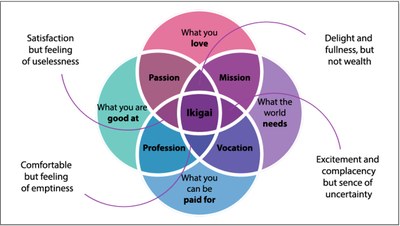Finding Your Strengths
Do you feel energized by the work you get to do every day? When you wake up in the morning, are you eager to get going? If you answer no to these questions, then perhaps you are not getting to spend enough time each day working in your areas of strength. Those who discover their strengths just might be able to craft a job more suited to those strengths and better serve themselves and their department. What if we could all identify and work in this sweet spot, at the intersection of four overlapping circles…what you are good at, what you love to do, what the system needs, and what you can get paid for? That sweet spot is what the Japanese call…Ikigai, which is loosely translated as “a reason for being”. Ikigai can be described as the intersection of your passion, mission, vocation, and profession.
Figure 1 - © 2019 DIY GENIUS

You can start to determine your Ikigai to figure out what you are good at by taking a test called Strengths Finder from the Gallup organization. This test has been taken by millions of individuals worldwide and it provides you with a profile of your top five areas of strength. Gallup defines a strength as the ability to consistently produce a positive outcome through near-perfect performance in a specific task (Quick Reference Guide to Strengths Basics, Gallup Organization, 2007). You get written descriptions of the characteristics and preferences of individuals who identify in each of your top five strength areas. (There are actually 34 strength areas, but you have to pay extra to see the other 29; the top five is more than enough for most of us). When I read the descriptions of my top five strengths (Learner, Context, Achiever, Analysis, Input) it nailed who I am, what I am good at and what I love to do. Many who take the Strengths Finder test report the same thing. The Strengths Finder test is a great start to defining your Ikigai so you can begin investing in your strengths because that is where excellent performance lives for you.
Why is knowing your strengths important? You need to invest in your strength to develop them to your full potential in that area. Just knowing your strengths is not enough. You may have a talent (strength) to play a musical instrument, but if you do not practice, that talent remains undeveloped. The effort expended should be considered an investment in yourself, and this effort is vital if we are to achieve our full potential in our areas of strength. High achievement is dependent more on the passion and perseverance we bring to our work. The psychologist, Angela Duckworth has written about how effort actually counts twice in her book, Grit (2016). She uses the following equations to illustrate just how effort does this:

In order to develop a strength, one should invest (put effort into) that strength in order to develop that strength. So taking the approach that Duckworth uses, that equation would be:
Talent x Investment = Strength Development
First, we identify our strength, then we put effort into developing those strengths. If we can do this and apply those strengths in our work setting, we are likely to be more engaged, more satisfied and of greater value to the organization that employs us.
To help you move toward structuring your job to take advantage of being able to work as much as you can in areas of strength for you. You will be more satisfied and engaged and may even discover joy in what you do as you are able to deliver excellence in your work. I recommend that you review some background information on StrengthsFinder and consider taking the test. You can get a code for the online test by buying either of these books, Strengths Finder 2.0 (Rath,T., 2007) or Strengths Based Leadership (Rath & Conchie, 2008).
Just imagine if we all could get closer to our Ikigai sweet spot. We would be doing our part to make UofL a great place to work. Go ahead. Take the StrengthsFinder test. It may change the trajectory of your work life.
What are your top five strengths? Did the test “get” you? Let us know, email HSCFacDv@louisville.edu with the word “Strength” in the subject line.
References
Duckworth, A. (2016). Grit: The power of passion and perseverance. New York, NY Scribner/Simon & Schuster.
Rath, T. (2007). StrengthsFinder 2.0. New York, NY: Gallup Press.
Rath, T., & Conchie, B. (2008). Strengths based leadership: Great leaders, teams, and why people follow. New York: Gallup Press.